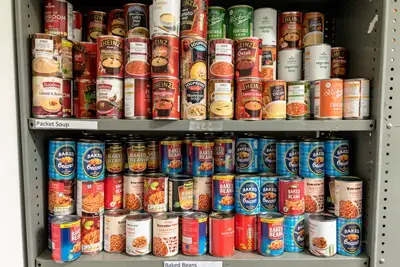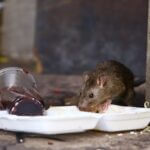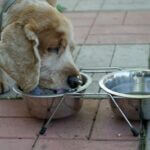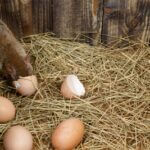Rats have a powerful bite force for their size and can gnaw through dense materials, including some kinds of metal, putting even canned food at risk.
When seeking food, these persistent rodents are instinctually driven to chew through items because they need to wear down their ever-growing teeth.
Rats can chew through canned food because steel and aluminum are softer metals than their teeth. On the Mohs hardness scale, rats’ teeth are 5.5, while steel and aluminum are 5 or lower.
Gnawing on canned food can damage teeth, but that’s irrelevant since rats’ incisors grow continuously.
If properly sealed, rats won’t be able to smell canned food. However, a small dent or puncture mark can release tempting odors that attract rats.
Rats have a sense of smell more than 4 times superior to humans and can detect the faintest smell from an improperly sealed or damaged can.
Can Rodents Smell Canned Food?
Rats can’t smell food that’s sealed within a can. If a commercially manufactured canned food has never been opened, it won’t release an enticing odor.
However, that changes if there’s any break in the can’s seal or the tiniest puncture mark. Rats have a powerful sense of smell and will detect this, even if you can’t.
According to Harvard Medical School, mice have about 1200 olfactory receptors and 14 trace amine-associated receptors, which are odor receptors. Rats have 1700 olfactory receptors.
Considering the number of odor receptors in rodents, it’s no surprise that rats can pick up on the smell of food. Sealed within a can or not, rats can detect and follow food odors.
If the canned food was opened at any time and sealed with a third-party cap, usually made from plastic, it might attract rats from outside the home.
However, it’s not the primary lure for rats that enter your home. Rats are far more likely to be attracted by powerful smells, such as those from a dirty kitchen or pet food left in open sight. They may also be lured into your home by the appeal of shelter, warmth, and water.
When given easy access and few other options, canned food may become a rat’s preferred choice. However, having canned food in the home doesn’t usually attract rats.
Rats won’t detect canned food if it’s completely sealed and never opened.
Can Rats Get Into Canned Food?
Rats gnaw at hard surfaces to keep their teeth trimmed. Gnawing through a can to reach the food is unlikely and would take days, but it’s theoretically possible.
Rats can bite or gnaw through anything that isn’t harder than their teeth. According to Earth and Environmental Science, the hardness of a rat’s teeth is 5.5 on the Mohs scale.
This scale is from 1 (softer ones, such as talc) to 10 (hardest minerals and gemstones, such as diamond). Rats’ teeth are higher on the scale than copper, ordinary steel, aluminum, and iron.
Most cans are made from steel, with a thin layer of tin on the surface, while others are made from aluminum. So, science shows that rats can get into canned food.
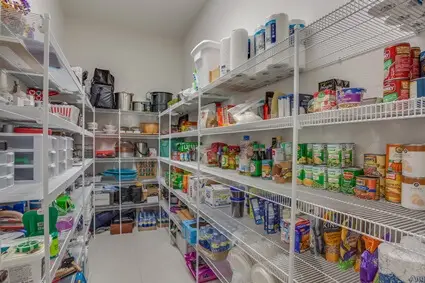
Can Rats Chew Through Cans?
You may fear that no canned food is safe from rats.
Rats can chew through most metal, plastic, or other cans. However, this will not happen immediately, and rats will seek easier meals instead.
The time will depend on the number of rats and the can’s material. If several rats descended on a regular aluminum or steel can, it would take less time to chew through it, especially if the combined effort is directed at a specific spot.
However, rats usually target easier-to-access food, like leftovers in plain sight. The average home offers plenty of food opportunities that don’t require the rat to chew for hours or days. If your canned food is kept out of easy reach and adequately sealed, rats are unlikely to target it.
Rats may find canned food unappealing if it’s properly sealed and they can’t smell it. The only exception will be rats chewing on the can to trim their teeth or for fun, not to reach food.
Due to their ever-growing incisors, rats must gnaw on abrasive materials to wear down their teeth and prevent overgrowth. If they don’t, this can lead to injury, discomfort, and an inability to eat.
Once the rat has breached the seal, it’ll detect the food within and continue until it can reach it. Since rats are intelligent animals, they may learn that these containers usually hold food.
Can You Protect Canned Food From Rats?
Canning is safer than plastic, tin, or foil for rat-proofing your food. Steel or aluminum cans are resilient, even though they aren’t impervious to rat chewing.
However, even the tiniest puncture mark can lead to contamination. According to Critical Reviews in Microbiology, rat-borne diseases are transmitted to humans through:
- Direct contact, in the case of rat bites.
- Consumption of food that’s contaminated by rat feces.
Bite marks can be a warning sign, but even the slightest puncture will make the canned food dangerous to keep. The best approach is to safeguard your canned food ahead of time.
Food safeguarding options include the following:
- Using glass containers, since glass can range from 5.5 to 7 on the Mohs scale.
- Keeping whatever food possible inside a refrigerator.
- Securing pantries with rat deterrents so that they’re less likely to gnaw on your cans.
Rats can chew through canned food, but it won’t be their first choice. Many food sources are more readily accessible, meaning rats will seek sustenance elsewhere.
Just check for bite marks before opening up and using the content of any of the cans that you’ve stored away. In the unlikely event that you find any small openings, throw the food out immediately.

